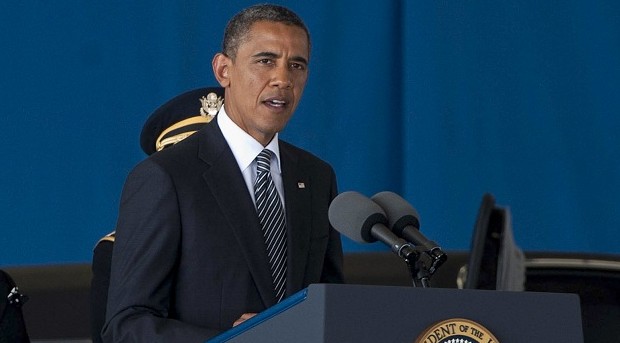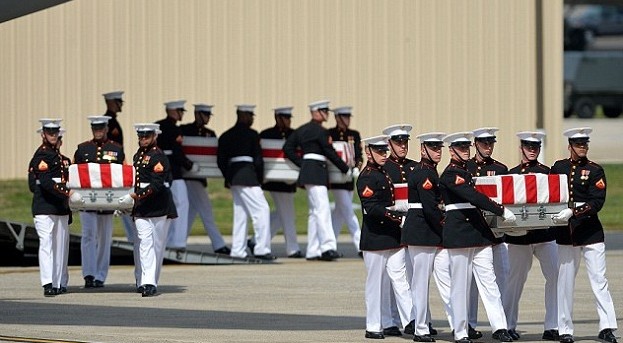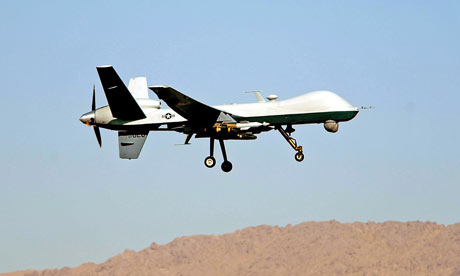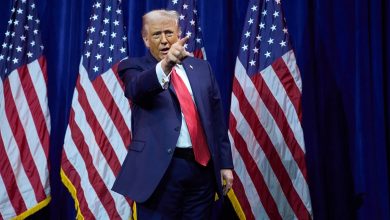U.S. Ambassador Chris Stevens brutally murdered in Libya and his colleagues bodies returned to U.S.
As four flag-draped coffins bearing the bodies of the Americans killed in Libya arrived in the United States on Friday, new details emerged of Ambassador J. Christopher Stevens’ final hours, alone, locked in a smoke-filled room in a diplomatic mission under siege.
In a solemn ceremony at Joint Base Andrews outside the capital, President Barack Obama said the victims “laid down their lives for us all” and vowed to honor their memory by never retreating from the world.
The arrival, broadcast live on news channels, proved an emotional culmination to an episode that has rocked Washington and U.S. embassies worldwide, even as details of those final fateful moments only now began to come clear.
When the attack on the diplomatic compound occurred, officials said, Stevens was separated from his security detail — and was located only later, at the hospital in Benghazi, where he had been pronounced dead.
Officials in Washington said they were investigating that blacked-out period, but as they conduct that inquiry, witnesses have emerged who said that Stevens had fled to a room in the diplomatic compound, hoping to find safety behind a locked iron gate and wooden door. But fires raged around the mission, and Stevens, unable to escape the smoke and heat, died of asphyxiation.

Witnesses say he was eventually discovered by people who rushed to see what was happening at the mission.
They broke a window, spotted Stevens,
who might or might not have been unconscious at the time, and removed him from the room.
According to guards at the compound, the attack began at about 9:30 p.m., without warning or any peaceful protest.
“I started hearing, ‘God is great! God is great!'” one guard said. “I thought to myself, maybe it is a passing funeral.” (All the guards spoke on condition of anonymity for their safety.)
The guard said he heard an American calling, “Attack, attack,” over his walkie-talkie as the chants came closer. Suddenly, there came a barrage of gunfire, explosions and rocket-propelled grenades.
“I saw the ambassador’s personal bodyguard — the one who was killed — running toward the villa where the ambassador was,” he said. Armed only with a light weapon, the bodyguard “was running there to protect him.”
Another Libyan guard said he saw Stevens escorted to the office in a wing off the main mission building, the room with an iron gate behind a wooden door. Three hours later, about 12:30 a.m., witnesses said that a crowd — possibly looters — broke through a tall and narrow window and found Stevens.
State Department officials said they do not know Stevens’ whereabouts during the battle, who took him to the hospital or who carried his body to the airport and into U.S. custody.
“We don’t know what happened with Chris Stevens,” Victoria Nuland, the State Department spokeswoman, said Thursday. “We also had, we believe, acts of mercy and generosity later at the hospital in Benghazi. We very, very much appreciate this.”
U.S. officials were also still trying to get more clarity on the arrests of four men said to be involved in the attacks. But as they continue sorting through intelligence, they have disputed suggestions floated in Washington and abroad that the attack in Benghazi was premeditated.
“We have no indication that that’s the case,” an administration official said.
The current information available to the White House suggests that the protests in Benghazi were spontaneous and spurred by the Cairo protests but evolved over time as Islamists took advantage of the situation, called in reinforcements and weaponry and mounted an attack.
When Stevens’ coffin arrived at Joint Base Andrews outside Washington on Friday, along with those of the three other Americans killed in the attack, Obama said: “Four Americans, four patriots — they loved this country, and they chose to serve it and served it well. They had a mission, and they believed in it. They knew the danger, and they accepted it. They didn’t simply embrace the American ideal; they lived it, they embodied it.”
Obama called Stevens “everything America could want in an ambassador.”
Of the three others killed in the attack, he said Sean Smith, a Foreign Service officer and an Air Force veteran, had “lived to serve.” Tyrone Woods, a former member of the Navy SEALs providing diplomatic security, was “the consummate quiet professional.” And Glen Doherty, also a former member of the SEALs providing security, “never shied from adventure.”




While you were considering whether taxing rich dudes another $75 bil per year was enough proof that your president deserved your vote, the World War III that you’ve been so worried about for three generations has finally began and you’ve mi…ssed it.
Ambassador J. Christopher Stevens, “everything America could want in an ambassador.” Sean Smith, a Foreign Service officer and an Air Force veteran, had “lived to serve.” Tyrone Woods, a former member of the Navy SEALs providing diplomatic security, was “the consummate quiet professional.” And Glen Doherty, also a former member of the SEALs providing security, “never shied from adventure” are all dead while your president and the media concentrate on lies about a poorly-made video.